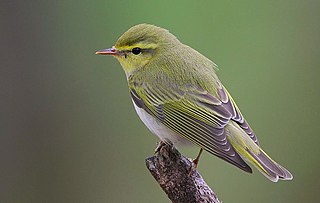
Leaf warblers are small insectivorous passerine birds belonging to the genus Phylloscopus.

The wood warbler is a common and widespread leaf warbler which breeds throughout northern and temperate Europe, and just into the extreme west of Asian Russia in the southern Ural Mountains.

The Arctic warbler is a widespread leaf warbler in birch or mixed birch forest near water throughout its breeding range in Fennoscandia and the northern Palearctic. It has established a foothold in North America, breeding in Alaska. This warbler is strongly migratory; the entire population winters in southeast Asia. It therefore has one of the longest migrations of any Old World insectivorous bird.

The greenish warbler is a widespread leaf warbler with a breeding range in northeastern Europe, and temperate to subtropical continental Asia. This warbler is strongly migratory and winters in India. It is not uncommon as a spring or early autumn vagrant in Western Europe and is annually seen in Great Britain. In Central Europe large numbers of vagrant birds are encountered in some years; some of these may stay to breed, as a handful of pairs does each year in Germany.

The yellow-browed warbler is a leaf warbler which breeds in the east Palearctic. This warbler is strongly migratory and winters mainly in tropical South Asia and South-east Asia, but also in small numbers in western Europe. Like the rest of Phylloscopidae, it was formerly included in the Old World warbler assemblage.

Hume's leaf warbler or Hume's warbler is a small leaf warbler which breeds in the mountains of inner Asia. This warbler is migratory and winters mainly in India.

The Eastern Bonelli's warbler, sometimes known as Balkan warbler, is a "warbler" in the leaf warbler genus Phylloscopus. It was formerly regarded as the eastern subspecies of a wider "Bonelli's warbler" species, but as a result of modern taxonomic developments, they are now usually considered to be two species:

The sulphur-bellied warbler is a species of leaf-warbler found in the Palearctic region. It was earlier also known by the name of olivaceous leaf-warbler.

The Gansu leaf warbler is a small passerine bird known only from China. It belongs to the leaf warbler genus Phylloscopus within the family Phylloscopidae. It was formerly treated as a subspecies of Pallas's warbler but is now regarded as a separate species based on differences in voice and cytochrome-b gene sequences.

The Chinese leaf warbler is a species of Old World warbler in the family Phylloscopidae. Its natural habitats are subtropical or tropical dry forests and subtropical or tropical high-altitude shrubland. It is found only in China.
The Kolombangara leaf warbler or sombre leaf warbler is a species of Old World warbler in the family Phylloscopidae. It is found only in Solomon Islands. Its natural habitat is subtropical or tropical moist montane forests. It is threatened by habitat loss.

The eastern crowned warbler is a species of Old World warbler in the family Phylloscopidae. It inhabits boreal and temperate forests in the east Palearctic.
Davison's leaf warbler or the white-tailed leaf warbler, is a species of leaf warbler. It was formerly included in the "Old World warbler" assemblage.

Ijima's leaf warbler is a species of Old World warbler in the family Phylloscopidae. The species is native to Japan, where it has been designated a Natural Monument under the 1950 Law for the Protection of Cultural Properties, with records also from Taiwan and the Philippines.

Blyth's leaf warbler is a species of leaf warbler. It was formerly included in the "Old World warbler" assemblage.

Brooks's leaf warbler is a species of Old World warbler in the family Phylloscopidae.

The green-crowned warbler is a species of leaf warbler. It was formerly included in the "Old World warbler" assemblage.

The chestnut-crowned warbler is a species of leaf warbler. It was formerly included in the "Old World warbler" assemblage.

The yellow-breasted warbler is a species of Old World warbler in the family Phylloscopidae. It is found in Indonesia, Malaysia, and Palawan Island in the Philippines. The species is most common on the islands of Sumatra and Borneo in Indonesia. Its natural habitats are subtropical or tropical moist lowland forest and subtropical or tropical moist montane forest.

The limestone leaf warbler is a species of warbler in the family Phylloscopidae. When this species was first seen, beginning in 1994, it was mistaken for the similar sulphur-breasted warbler. It is smaller than the sulphur-breasted warbler, and has more rounded wings. The plumage is almost identical, with comparisons showing only a slightly colder yellow below and a greyer tinge above. Although smaller, the bill is proportionally larger than that of the sulphur-breasted warbler. Accurate measurements are not available; the holotype has a wing length of 5.2 cm (2.0 in); the paratype a tail length of 3.7 cm (1.5 in) and a bill length of 1.39 cm (0.55 in). The species is known to occur in northern Vietnam and Laos, and potentially also occurs in southern China as well. The species name, calciatilis, means "dwelling on limestone", which along with its common name is a reference to its natural habitat, which is broadleaved evergreen and semi-evergreen forest growing around limestone karst mountains. The bare-faced bulbul, described in 2009, was found in the karst of the same region.


















